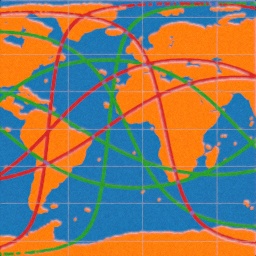Language Python and tag Applied mathematics at other sites
- Language Python and tag Applied mathematics in Wikipedia
- Language Python and tag Applied mathematics in Google
Bruteforcing Countdown numbers game with CUDA(19th April 2023) |
|||||
|
Youtuber Another Roof posed an interesting question on his video "The Surprising Maths of Britain's Oldest* Game Show". The challenge was stated in the video's description: "I want to see a list of the percentage of solvable games for ALL options of large numbers. Like I did for the 15 options of the form {n, n+25, n+50, n+75}, but for all of them. The options for large numbers should be four distinct numbers in the range from 11 to 100. As I said there are 2555190 such options so this will require a clever bit of code, but I think it’s possible!". His reference Python implementation would have taken 1055 days (25000 hours) of CPU time (when all four large numbers are used in the game), but with CUDA and a RTX 4080 card it could be solved in just 0.8 hours, or 31000x faster!
|

|
||||
Satellite crash course(13th June 2021) |
|||||
|
Since hearing the news of a faling Chinese rocket booster Long March 5B and being reminded that Earth's surface is about 70% ocean, I got interested on how the orbital parameters affect the odds of crashing to ocean vs. ground. I was nearly finished with the project when I realized that Earth is rotating under the satellite, thus invalidating all the results! This doesn't take orbits' eccentricity into account either, but I've heard that the athmospheric drag has a dendency of reducing it to zero as the orbit falls. Anyway, I found the various "straight" paths around the globe interesting and decided to publish these results anyway. In conclusion there are paths which spend only 9 % on top of land (including lakes) and 91% on top of ocean or up-to 57% on top of land and 43% on top of ocean.
|

|
||||
Home
|
Navigation
| Home | (Home page) |
| About | (About me) |
| Platform | (About this blog) |
External
| (Niko Nyrhilä) | |
| GitHub | (nikonyrh) |
| Stackoverflow | (nikonyrh) |
Most recent
| Bruteforcing Countdown numbe... | (2023 Apr) |
| Cheating at Bananagrams with... | (2023 Apr) |
| Introduction to Stable Diffu... | (2022 Nov) |
| Matching puzzle pieces together | (2022 Jul) |
| Single channel speech / musi... | (2022 Feb) |
Most frequent tags
| Computer Vision | (13) |
| GitHub | (12) |
| Databases | (9) |
| Elasticsearch | (6) |
| FFT | (5) |
| Rendering | (5) |
| Applied mathematics | (4) |
Most frequent languages
| Python | (13) |
| C++ | (11) |
| Matlab | (10) |
| Keras | (6) |
| Clojure | (6) |
| Bash | (6) |
| PHP | (6) |
Co-occurrence matrix
| Matl | Pyth | C++ | Cloj | Bash | Kera | |
| Comput | 6 | 6 | 3 | 1 | 0 | 5 |
| GitHub | 0 | 2 | 1 | 4 | 3 | 0 |
| Databa | 0 | 3 | 2 | 2 | 1 | 0 |
| Render | 3 | 0 | 3 | 0 | 0 | 0 |
| Nginx | 0 | 1 | 0 | 0 | 4 | 0 |
| Autoen | 0 | 3 | 0 | 1 | 0 | 2 |
| Elasti | 0 | 2 | 0 | 3 | 0 | 0 |
| FFT | 3 | 1 | 1 | 0 | 0 | 1 |
| Data S | 2 | 1 | 2 | 1 | 0 | 1 |
| JVM | 0 | 1 | 0 | 3 | 1 | 0 |
| Docker | 0 | 1 | 0 | 0 | 3 | 0 |
| FastCG | 0 | 0 | 3 | 0 | 0 | 0 |
| Applie | 2 | 2 | 0 | 0 | 0 | 0 |
| Field | 2 | 0 | 2 | 0 | 0 | 0 |
| Omnidi | 2 | 0 | 2 | 0 | 0 | 0 |
| Affine | 2 | 0 | 2 | 0 | 0 | 0 |
| Master | 1 | 0 | 2 | 0 | 0 | 0 |
| Archit | 0 | 1 | 0 | 0 | 2 | 0 |
| Visual | 1 | 0 | 2 | 0 | 0 | 0 |
| Spark | 0 | 1 | 0 | 0 | 2 | 0 |
| Blog | 0 | 0 | 0 | 2 | 0 | 0 |
| Hyphen | 0 | 0 | 0 | 2 | 0 | 0 |
| Stack | 0 | 1 | 1 | 0 | 0 | 0 |
| SQL | 0 | 0 | 1 | 1 | 0 | 0 |
| Busine | 0 | 1 | 0 | 1 | 0 | 0 |
| Signal | 0 | 1 | 0 | 0 | 0 | 1 |
| Encryp | 0 | 0 | 0 | 0 | 1 | 0 |
| Git | 0 | 0 | 0 | 1 | 0 | 0 |
| Stable | 0 | 1 | 0 | 0 | 0 | 0 |
| Redis | 0 | 1 | 0 | 0 | 0 | 0 |
| Thrust | 0 | 0 | 1 | 0 | 0 | 0 |
| Kibana | 0 | 0 | 0 | 1 | 0 | 0 |
| Astron | 1 | 0 | 0 | 0 | 0 | 0 |
| Mustac | 0 | 0 | 1 | 0 | 0 | 0 |
| NAT | 0 | 0 | 0 | 0 | 1 | 0 |
| jQuery | 0 | 0 | 1 | 0 | 0 | 0 |
| SSH | 0 | 0 | 0 | 0 | 1 | 0 |
| Happyh | 0 | 0 | 1 | 0 | 0 | 0 |
| Backup | 0 | 0 | 0 | 0 | 1 | 0 |
| Pthrea | 0 | 0 | 1 | 0 | 0 | 0 |
| AWS | 0 | 0 | 0 | 0 | 1 | 0 |
| SIFT | 0 | 0 | 1 | 0 | 0 | 0 |
| SURF | 0 | 0 | 1 | 0 | 0 | 0 |
| Conjug | 0 | 0 | 1 | 0 | 0 | 0 |
| Kalman | 0 | 0 | 1 | 0 | 0 | 0 |
| Partic | 0 | 0 | 1 | 0 | 0 | 0 |
| Gradie | 0 | 0 | 1 | 0 | 0 | 0 |
| Simult | 0 | 0 | 1 | 0 | 0 | 0 |
| Roboti | 0 | 0 | 1 | 0 | 0 | 0 |
| Princi | 1 | 0 | 0 | 0 | 0 | 0 |
| Receiv | 1 | 0 | 0 | 0 | 0 | 0 |
| Linear | 1 | 0 | 0 | 0 | 0 | 0 |
| Suppor | 1 | 0 | 0 | 0 | 0 | 0 |
| Machin | 1 | 0 | 0 | 0 | 0 | 0 |
| Discre | 1 | 0 | 0 | 0 | 0 | 0 |


